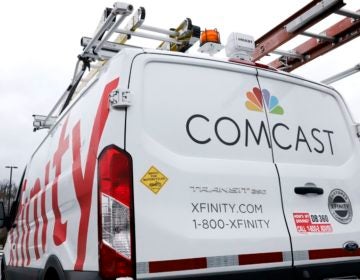The end of net neutrality: Will users notice their missing internet freedom?
The rules protecting internet freedom disappeared June 11.

(STori/BigStock)
The rules protecting internet freedom disappeared June 11, but no one really noticed very much.
The Federal Communications Commission repeal of net neutrality effectively allowed internet providers to slow or block internet speeds for websites and content of their choosing.
“Without sounding too dramatic, losing net neutrality changes the underlying logic of the internet,” said Victor Pickard, associate professor at the University of Pennsylvania’s Annenberg School of Communication.
But the U.S.’s nearly 300 million internet users will find nothing amiss as they go about their day, promised corporate providers like AT&T and Comcast. Philadelphia-based Comcast, the nation’s largest cable and internet provider, does not intend to change its policies, slow, or block content, wrote Dave Watson, the CEO of Comcast Cable, in a public blog post.
“It certainly would be bad PR for them to do it overtly, and I don’t think it’s something that would happen right away,” Pickard said.
But experts and activists fear a future wherein both content providers and consumers could face new fees for high internet speed, wrote Evan Greer, the deputy director of Fight for the Future, in an online statement.
“I don’t think it’s a healthy situation for a democracy to even have that risk,” Pickard said. “One of the reasons why net neutrality is so important is because most Americans only have access to one or two major internet service providers in their local community. If we actually had competition, losing net neutrality would not be as much of a concern.”
Eventually, websites that use high bandwidth, such as streaming services like Hulu or Netflix, could bear the brunt of the rules change. An internet provider could choose to slow streaming and then force services to pay more for faster speeds, creating “fast and slow lanes” on the internet, Pickard said. That likely will not damage big companies with deep pockets like Netflix, but small startups, local news, and nonprofits could find themselves shut out if they can’t come up with the funds.
“There is a perverse incentive for internet source providers to set up what’s known as pay-to-play. They can force certain content creators to pay more so that their content is given preferential treatment. It also can set up a situation where internet users can be forced to pay for bundled content,” Pickard said.
Congress has the power to overturn the FCC’s repeal and prevent the commission from erasing internet freedoms in the future, thanks to the Congressional Review Act. This act allows Congress to challenge the regulations of any federal agency through a joint resolution. Last month, the Senate passed a resolution to overturn the law 52-47, thanks to the help of three Republican senators – Susan Collins (R, Maine), Lisa Murkowski (R, Alaska) and John Kennedy (R-LA).
In the House of Representatives, Congressman Mike Doyle (PA – 14th District) hopes to use a discharge petition to force a vote on the floor, but the petition requires a simple majority of signatures. One hundred and seventy representatives have signed the document, but the petition needs at least 218. In addition to all Democrats, at least 20 Republicans would need to sign on to force the vote. Aside from Doyle, only one other Pennsylvania congressman has signed — Congressman Conor Lamb (18th District). And there’s no guarantee President Donald Trump would approve the resolution.
Fight for the Future holds onto hope that Congress will overturn the rules change. “The Senate already passed a historic bipartisan resolution disapproving the repeal. Now the entire Internet is laser-focused on getting the House of Representatives to do the same,” Greer wrote.
Net neutrality rules are beginning to change on a state by state basis as well. Washington and Oregon have passed laws that aim to protect net neutrality, while the governors of New York, New Jersey, Montana, Vermont, and Hawaii have signed executive orders intended to restore internet freedoms in their states. Pennsylvania Senator Larry Farnese introduced a bill to the Pa. Senate in late January, but it has languished in committee since February.
However, the FCC rule change bans states from creating their own laws to regulate net neutrality, and the cable industry group US Telecom plans to sue the states with legislation, according to Wired.
Internet providers also advocate for legislation by Congress, but not a return to the FCC rules. FCC rules classified internet providers as Title II “common carriers.” The FCC’s 1934 charter granted the FCC the power to examine the practices and policies of Title II carriers on a case by case basis, Pickard said.
In 2017, for example, the FCC examined programs by AT&T and Verizon that allowed users unlimited data on the companies’ own services — AT&T’s “Sponsored Data” and Verizon’s “FreeBee Data 360” — while charging users extra if they exceeded their data cap on other services. This practice is called “zero-rating,” and the report found that the practices of AT&T and Verizon “present significant risks to consumers and competition.”
Under the previous law, Comcast could be subject to the same kind of investigation and reporting used in the AT&T and Verizon zero-rating case.
But now, the repeal of net neutrality laws classifies Comcast as a Title I “information service provider,” which limits the FCC’s regulatory authority.
Comcast hopes for legislation that protects some net neutrality principles, such as prohibitions against blocking or throttling internet speeds, while remaining opposed to the Title II classification, Watson wrote. Other major providers have shared similar goals.
WHYY is your source for fact-based, in-depth journalism and information. As a nonprofit organization, we rely on financial support from readers like you. Please give today.




